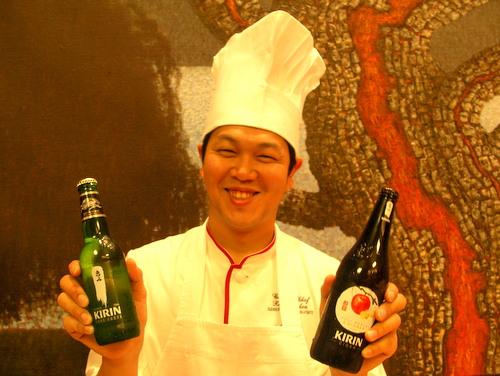
On October 23rd to 25th, RACV club held a member only event featuring Mr Kentaro Chen as a special guest chef. We were able to achieve a chance to have a personal interview with him during the event on his break to discuss his thoughts on the event, his life, and many more.
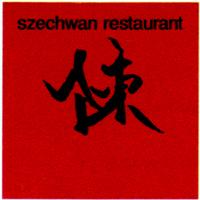
Kentaro Chen
Kentaro Chen was born in 1979 Tokyo Japan. In 2002 he entered the company Akasaka Shisenhanten and began his training as a chef at “Szechwan Restaurant Chen”. He studied abroad for 2 ½ years from 2005 at Szechwan University located in Chengtu, capital of Szechwan province in South East China. While he was abroad, he trained his skills at 菜根香(pronounced Cai Gen Xiang) under the sue chef 曾 国華(Zheng Guo Hua). Once he returned to his home country he continued developing his skills at Shisenhanten Group, and has now become the celebrity chef of Japan, appearing in cooking classes, events, and TV programs while working his career at Akasaka Shisenhanten.
What was the reason that gave you motivation to organise this event in Melbourne?
The reason will have to be “relationship” and “opportunity”. It first influenced me when I travelled to Sydney as my father’s (Kenichi Chen) assistant for Chef Inukai’s (Restaurant Blancharu) event. I then came back the following year, and the year after and so on which build my relationship with the customers and everyone involved. These relationships and opportunities gave me the chance to get an invitation to Melbourne.
My father and I are both chefs so our life is greatly influenced by our customers. We naturally enjoy creating simple and delicious food, present good service, and hearing customers say “It was delicious”. I believe that is our motivation and purpose in our life.
The international influence of the TV program “Iron Chef” gave me an opportunity to travel over sea as an assistant for my father. I came to Melbourne for the first time during my second year and here I met Chef Arakane, Chef Mark from RACV, and other great people, and I made many friends during my stay. I want to treasure this relationship, and with the support and hard work of these people, I was able to get an invite to Melbourne again.
What is your impression of the Australian customers?
The impression was warm and bright. Although they eat quite slow…
At first I was feeling quite nervous. The Szechwan cuisine is spicy and sometimes gives you the numb tongue. So the first thing I kept in mind was to determine what kind of taste is enjoyed by the Australian people. I also asked people for suggestions.
But because this is my opportunity to express my own taste and food, I am thinking of serving the original Shisenhanten flavoured cuisine. I am working on including the Australian ingredients with the food to express the flavour.
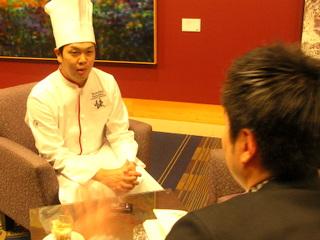
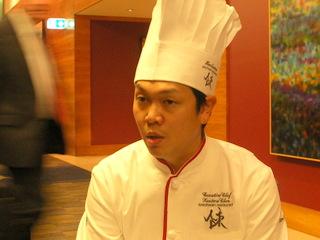
What was the reaction of the Australian customers? Isn’t there some customers from overseas who give positive reviews such as “It was delicious!” when they visit the Shisenhanten in Japan?
Yes, I was very pleased! They said “Fantastic! Fantastic!” and I was really happy.
Usually when I work in a restaurant cooking food, or serving food in an event like this one in Melbourne, I have a chance to communicate with the customers and I can understand when they are really happy with my food you know? These feelings I can understand even though I don’t speak their language, and these situations make me very very happy! I believe it really adds a great deal of experience to our career.
What gave you the motivation to enter the hospitality environment?
I grew up in a home where my grandfather created the Shisenhanten in Japan, and my father spread the Chinese cuisine throughout the nation through his appearance in the “Iron Chef”.
I had already decided to become a chef when I was in high school. I began working as a part time at a local Italian restaurant when I was in my 1st year of high school. The head chef of the restaurant was a very kind and nice person, and food was exceptional. My father, mother, grandparents, and all my family came to eat because I was working there, and they all said “Delicious! Delicious!”
While I was there serving first courses and other small things, I began to think to myself “I knew cooking is great!” and when I realised I have decided to be a chef.
Your decision wasn’t due to the influence of your father or something related to that source?
No, his presence definitely contributed to my decision. I ended up choosing Chinese cuisine due to his influence but I think I liked it naturally anyway.
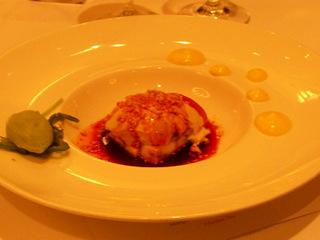
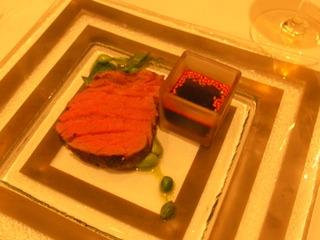
▲LEFT: Traditional Chengdo Month Watering Chicken, RIGHT: Local Beef Szechuan Style
I was surprised you began your career at an Italian restaurant, but in the end you chose to take Szechwan style. What was your mental status at that time?
I went to watch the “Iron Chef” live. At that time, the series has already ended, however they were doing a special revival edition for the year 2000 and my father and Chef Sakai battled each other. I was there to cheer for my father.
Watching live is absolutely amazing. I often thought “Amazing.” when I was watching the TV program, however, the actual intensity when you are with them live is amazing. I still get goose bumps when I remember that day.
Once the battle was finished, my father and Chef Sakai hugged each other. When I saw that, I thought to myself “That was cool!” “I am going to learn Chinese food!” I didn’t really have a reason. I just thought it was truly cool at that time.
At the time, I was a university student studying French, but I told my father “I want to learn Chinese food! I want to work in a restaurant as soon as possible! I don’t care if I have to quit university.” However, he replied by saying “If you enter this world of hospitality, you will not be able to do anything else you wished to do!” “If you want to save money and go somewhere then go while you can.” So I went to many places like France.
But I honestly think the time when I watched the program live was when I had received the most motivation. I can still exactly remember my happiness at that time.
So were you still young when the “Iron Chef” program was still broadcasted on TV every week?
The program started when I was in 2nd year of junior high school.
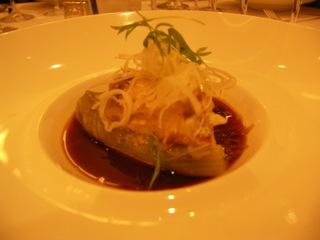
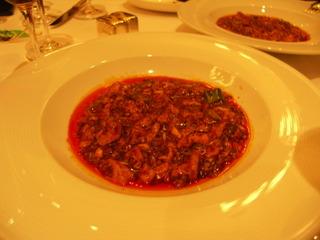
▲LEFT: Chen Family Recipe of Steamed Fish,
RIGHT: Kentaro Mapo Dofu which requires for 5 to 6 years to develop skills of making this dish for customers(!!)
What did you actually impressions when you watched your father’s appearance on TV?
As an ordinary audience, I thought “These people are amazing!” even though he is my father. They were suddenly given their main ingredients and organised the meal in 1 hour, which to me was absolutely amazing. And more than that, the meals looked delicious so I always thought to myself “I want to eat that! I want to eat that!” So every time the judges say “It was delicious”, I wanted to ask “Please tell me what it taste like” while enjoying watching the program.
My father lost against Italian Chef Yamada when they battled the cabbage battle. At that time I was in the middle of shifting from junior high school to senior high school. The pasta that Chef Yamada made in that battle looked so delicious I claimed “I want to eat that! I want to eat that!” and I ended up going to Chef Yamada’s restaurant in Shimokitazawa with my family. I was a little nervous but the meal was really delicious. I thought my father didn’t really care too much back then, but come to think of it now, maybe he did care a little (laugh).
On rare occasions, my father will take me to other restaurants and say to me “In this world, there are so many delicious foods.” I believe I was blessed with great learning environment. If I was born in a different family, I don’t know what I would have been doing right now.
I believe this is a very common question but as a Shisenhanten 3rd Generation do you have any pressure?
This is a very common question (laugh). If I have a choice between yes and no, the answer is of course yes (laugh).
When I was still an apprentice there were many situations where I felt responsible to solve the problems that arouse. My father’s illness was one of them however later on, these events allowed me to realise that cookery skills and knowledge cannot be acquired in 1 or 2 years. Although at that time, I didn’t have sufficient ability or knowledge and I thought there was no point in being impatient.
So to seek motivation, I decided to go to Szechwan province. My grandfather and my father can both speak fluent Chinese and also have the knowledge of real Szechwan cuisine. I thought if I move go there something will change, so begged and begged and acquired permission to go to Szechwan province.
I stayed there for about 2 years, made friends, and even though many things happened, I was still able to achieve what I desired thanks to the support of staff and workmates of Shisenhanten. If I was alone, I would not have been able to achieve anything. I began to feel the pressure of taking position as the 3rd generation when my family left me the history of Shisenhanten in trust of my hands as I studied in the environment with workmates and family.
Instead of thinking negative, as well as improving my own skills and knowledge, I believe we have to work together as a team. I although think that for me being able get invited in events like this is all thanks to my father and also because I was blessed with good environment of Shisenhanten. I always try to use these kinds of chances given to me and keep it precious.
Even while we are talking like this, the staff is running around working hard so I seriously believe without everyone’s help, I would not have been able to participate in these kinds of events. I want to work hard for those people supporting me and spread Shisenhanten to wider areas while keeping in mind that we are always a team. This time I was given this kind of chance thanks to chefs like Chef Arakane and the staff, and we mustn’t forget that it is not something that can be done in a matter of 1 or 2 days.
Before I always thought “He is lucky, going aeroplanes and doing many things”, whenever my father was travelling overseas, however, when I actually go myself, my impression was completely different. I realised I have to communicate with customers, make friends, and hit them with the very best of my abilities.
This time I brought with me one of my most trustworthy workmate Chef Inoue, because I wanted to show these very important aspects to the most important person in my team. I wanted him to understand the importance of communication and have the same motivation as me.
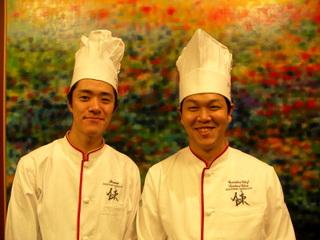
▲Chef Inoue is on right. They are very close though they work at different branch of Shisenhanten.
I think Shisenhanten has a wonderful teamwork and fantastic team strength. We were deeply moved the last time we met when all the staff knew our arrival and came out to greet us.
That is my father’s motto.
In the days when my father was an apprentice, my father was a completely different person to now. My grandfather was a very amazing chef and my father was a very unsocial and scary person he said, and I believe he was like that because it was common back in those days. My father said he wasn’t interested in my grandfather’s amazing cooking however, he was very happy when my grandfather ate his cooking.
My father said he always wanted to create a more social environment for the workers when he became the top of the team, so these days his always bringing up this topic to our conversation. I believe he must have worked with a lot of patience. He often behaves in a cheerful manner but being working in the same environment, I began to feel that “he must have gone through lots of trouble” throughout his life.
What is cooking to you, Chef Kentaro?
Well…, for me…., cooking is like my soul. Without it, I won’t be able to live and at the same it is what I live for. They have left me something wonderful, and it has become my treasure. So I want to pass on this treasure to as many people as I can. Although in this world of hospitality, everyone has their own preference and so, if out of 10 people, not all 10 will like my cooking. However I would like to show them what I feel, not only through the taste of food but also from all the other great things too.
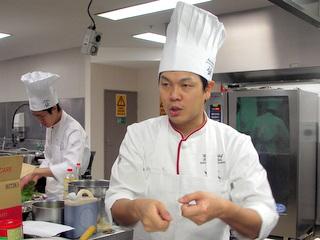
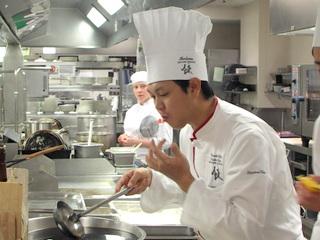
What are some of the challenges you want to face in this world of hospitality?
I believe in cookery, not only flavour but also that person’s ideas are passed on from person to person. So it’s the matter of how to leave that information behind to pass on to the next generation. It is something that I need to keep studying, and keep in mind, so that I can share my thoughts with everyone around me. At the moment I am in that process of passing on my ideas and studying together with my staff.
It’s not just because of the decrease in the number of children, but the number of people wanting to learn Chinese cuisine is dropping. I want to increase the level of interest towards Chinese cuisine by working hard. I am determined to stand in front of the line and lead the group so that more people can watch me and feel, “If I try my best I wander if I can be like him?”
What is Chef Kentaro’s favourite motto?
It is 「低賞感微」(Tei-Sho-Kan-Bi). This was a word which my grandfather used to often say.
「低」”Tei” means to keep your head low even if age or your position become a higher rank. 「賞」”Shou” means to support and praise friends, families and whoever you meet. 「感」”Kan” stands for feeling of gratitude. It means never forget the feeling of gratitude when someone gives you help and support. And the last, 「微」”Bi” is the most important of all at Shisenhanten and all in general. It stands for smile and laughter. Like in the Japanese saying “Fortune comes in by a merry.”
You can definitely not make a good cooking if you cook with a sour look. Even if you use exactly the same ingredients and seasoning, the quality will be completely different depending on your mood during the process. This is a definite.
I believe these kinds of phrases are created to become a guideline for humans to be able to take proper action in their everyday lives. Therefore I believe it is important to keep in mind the meanings which these phrases are trying pass across to us. I’m still not in the age of having bad memory however I still stress myself not to forget the message my grandfather left me. When I think about it now, I believe he was always repeating it to me so he would not forget himself.
As a human, when our work becomes busy, we tend to say “It’s so busy, it’s so busy”, however I think we should be grateful to be able to have a job, and therefore always I try to convince myself and keep that kind of momentum in my mind while working.
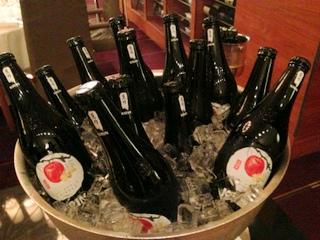
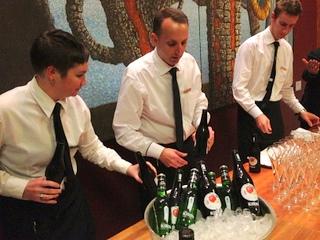
▲Welcome drink of Kirin Cider ginger flavour matching with canapes
There are many chefs in the age of 20’s~30’s that are doing cookery overseas. Would you be able to give a message for those people?
Cooking is art. Whatever you create will be consumed instantly, and everyone has their own ideas and identities. I wish everyone can use those unique identities and ideas to spread the great aspects of cookery to the world.
I believe being a chef is wonderful work to be able to make people happy when they eat your cooking and it also give you the feeling of satisfaction, which I want more people to know. So to do so, us chefs in this present time should work hard to pass on this precious message to our next generation. Even though fast food industry is growing, I still hope we can always keep in mind the greatness of creating something for someone to enjoy.
Just before the interview started, Chef Kentaro began saying “My favourite food is twice cooked pork slices, mapo doufu, tantan noodles…., oh excuse me excuse me” to ease the tension for us.
Chef Kentarou Chen never forget his smile and he supports the core of Shisenhanten as 3rd generation while keeping many things in mind and has the ability to change any pressure to his vitality.
Chef Kentaro Chen, Thank you very much!
Interviewer: Jun Hasegawa
Photos & Edit: Yoshimi Okita
Translate: Masa Arakane



